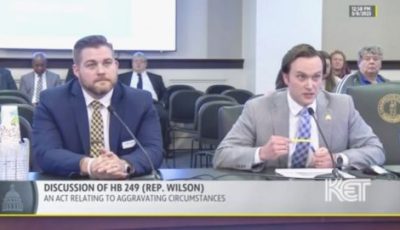Two constitutional amendment votes to be posed to voters next week
In addition to the many names to be found vying for various state and local offices on next week’s ballot, voters may notice two additional options on the back of their ballot. Despite being relegated to the back, those options—which will be simple “yes” or “no” selections—carry some weight for the future landscape of Kentucky politics.
The two options voters will find on the back of their ballots are proposed amendments to the Constitution of Kentucky, one of which could allow the General Assembly to call themselves into special sessions and the other which could completely eliminate the right for an abortion within the state.
That sounds relatively simple; however, the questions set to appear on the ballot are both wordy and potentially confusing in the way they will be presented.
The first question to be posed to voters will read as follows:
“Are you in favor of amending the present Constitution of Kentucky to repeal sections 36, 42, and 55 and replace those sections with new sections of the Constitution of Kentucky to allow the General Assembly to meet in regular session for thirty legislative days in odd-numbered years, for sixty legislative days in even-numbered years, and for no more than twelve additional days during any calendar year if convened by a Joint Proclamation of the President of the Senate and the Speaker of the House of Representatives, with no session of the General Assembly to extend beyond December 31; and to provide that any act passed by the General Assembly shall become law on July 1 of the year in which it was passed, or ninety days after passage and signature of the Governor, whichever occurs later, or in cases of emergency when approved by the Governor or when it otherwise becomes law under Section 88 of the Constitution?”
Currently, the General Assembly meets for 30 days in odd-numbered years and 60 days in even-numbered years, according to a release from the Kentucky Office of the Attorney General. Any extension of those yearly meetings, or any special sessions needed later in the year, can only be convened through the governor.
By selecting “yes” to the above question, voters would be agreeing to allow the General Assembly the power to circumvent the governor and meet as they deem necessary. A “yes” vote would also allow the General Assembly to adjust the session calendar with a three-fifths vote.
In a nutshell, passage of the amendment would allow legislators to meet more often and potentially change laws more frequently.
The second question to be posed to voters will read as follows:
“Are you in favor of amending the Constitution of Kentucky by creating a new Section of the Constitution to be numbered Section 26A to state as follows: To protect human life, nothing in this Constitution shall be construed to secure or protect a right to abortion or require the funding of abortion?”
The way in which it is written could cause some confusion on how to answer, but the question essentially asks if Kentucky’s constitution should not protect the right to abortion.
In June, the U.S. Supreme Court overturned Roe v. Wade, standing legislation which had made access to abortion a federal right for nearly 50 years. The decision reverted abortion rights issues back to the state level, which initiated a cascade of “trigger laws” in several states, including Kentucky.
Once the laws had been triggered, nearly all abortions were banned in Kentucky.
According to state law, abortions are prohibited once the embryo the “pregnant woman is carrying has a detectable fetal heartbeat.” The only exception under the law is if there is a medical emergency in which an abortion is necessary to save the mother’s life.
The ban was briefly lifted following court challenges, but was reinstated in August by a Kentucky appeals court and is currently pending a final ruling by the Kentucky Supreme Court.
With that in mind, a “yes” vote would amend the state’s constitution to prevent abortion rights and funding from being protected, while a “no” vote would prevent any additional wording to be added, keeping abortion rights issues out of the constitution.
The 2022 General Election will be held Tuesday, Nov. 8.








